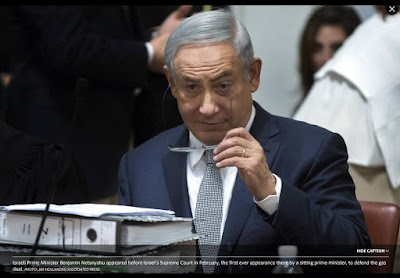Deal to be suspended for one year; government required to amend terms
By ORR HIRSCHAUGE and RORY JONES
March 27, 2016
TEL AVIV—Israel’s Supreme Court on Sunday ruled against a landmark deal to develop and export the country’s offshore gas reserves, a major setback for Prime Minister Benjamin Netanyahu, who campaigned for it.
The panel of judges called the deal unconstitutional, citing a clause in its framework that gave energy companies pricing and regulatory stability for 10 years regardless of potential shifts in the government. The main stakeholders in the fields, U.S.-based Noble Energy Inc. and Israeli partner Delek Group Ltd, had argued that the stability clause was required for them to make the investments necessary to develop the fields.
The deal will be suspended for one year, the court said. Mr. Netanyahu’s government will be required to amend it during that period and potentially put the details to a vote in the Israeli parliament, known as the Knesset.
Israel’s regulator ruled the plan anticompetitive in 2014, saying Noble and Delek held a monopoly.
The energy companies have already been through several rounds of regulatory and legislative hurdles that have significantly delayed development. In total, Israel sits on fields with more than 32 trillion cubic feet of gas.
“The supreme court’s resolution severely threatens the development of Israel’s gas reserves. Israel is seen as a country with exaggerated legal interference that makes doing business hard,” Mr. Netanyahu said on his official Twitter account. “We will seek alternative ways to overcome the serious harm inflicted on Israel’s economy by this hard to understand resolution.”
Delek and Noble issued a joint statement with other companies involved. “In its resolution the court accepted the framework in whole, opposing only the stability clause. We congratulate such a resolution,” it said. “We call upon the government to put into place terms that include stability in a timely fashion.)
The deal hasn’t been popular domestically. Thousands of Israelis took to the streets over the past year in protest, complaining it would line the coffers of big business, offer Israeli consumers uncompetitive pricing compared with other Western countries, and send too much gas outside Israel, an energy-security risk.
In December, Mr. Netanyahu signed off on the deal, invoking an antitrust clause for the first time to force it through on grounds of national security.
The Israeli leader said the development of the gas reserves would enable Israel to develop economic ties with countries such as Jordan, Egypt, Cyprus, Turkey and Greece, a diplomatic boon and a critical measure for national security.
In response to Mr. Netanyahu’s decision, opposition lawmakers filed a petition in the court that objected to the plans to circumvent the regulator. Mr. Netanyahu appeared before the court in February to defend his move, the first ever appearance there by a sitting prime minister.
Write to Orr Hirschauge at Orr.Hirschauge@wsj.com and Rory Jones at rory.jones@wsj.com
SOURCE
